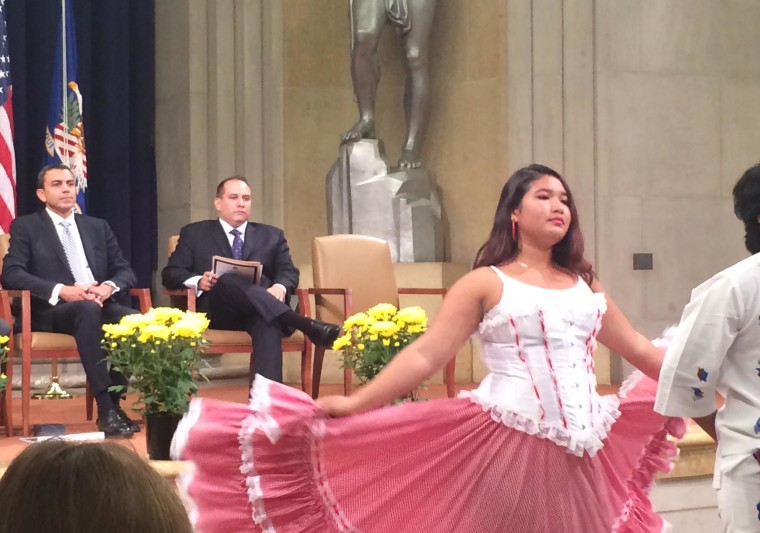A federal prosecutor nominated to the U.S. Court of Federal Claims said the possibility he will be the first Hispanic judge on that court is bittersweet.
Armando Bonilla, Department of Justice associate deputy attorney general, said his own research shows 101 judges have served on the court that dates back to 1855, to the administration of the nation’s 14th president, Franklin Pierce.
“As exciting as it is to be the first Hispanic to achieve something, my wish for future generations, including my own children … is that we replace the word first with yet another,” Bonilla said in an emotional speech at DOJ marking Hispanic Heritage Month.
“As exciting as it is to be the first Hispanic to achieve something, my wish for future generations, including my own children … is that we replace the word first with yet another,” Bonilla said in an emotional speech
President Barack Obama nominated Bonilla to the U.S. Court of Federal Claims in May. He is awaiting Senate confirmation for what would be a 15-year term. The 16-judge court hears cases of lawsuits filed against the federal government, many of them dealing with tax refunds and contract issues, according to the court’s website.
Speaking in The Great Hall of the Justice Department, Bonilla told of deciding to become a lawyer because he spent years as a kid cleaning law firm offices at night with his parents, something that he was once deeply embarrassed about, but that he now wears “as a badge of honor.”
Today, four percent of the nation’s 1.2 million practicing lawyers are Hispanic, Bonilla said. In DOJ, 400 of the 11,000 are Latinos, including six of the 93 U.S. attorneys, he said.
“The day I was formally sworn into the Bar, my Dad, who was 5-feet-6 on a good day, walked around as if he were 7 feet tall," he said.
Bonilla started his career as a law clerk for a federal judge in New Jersey, where his family moved from the New York projects. He has been at DOJ since 1994. He worked in the the Civil Division’s commercial litigation branch and as a prosecutor in asset and forfeiture and money laundering and the public integrity section of the Criminal Division.
Bothered that he and others saw his acceptance to Seton Hall Law School as hinging on affirmative action, he was advised by the Dean: “It’s not how you got in. It’s what you do while you are here.” When he graduated, he was accepted to the Attorney General’s Honors Program, launching his DOJ career.
Bothered that he and others saw his acceptance to Seton Hall law school as hinging on affirmative action, he was advised by the Dean: “It’s not how you got in. It’s what you do while you are here.” He said it made him double down for his own good and for future applicants. When he graduated, he was accepted to the Attorney General’s Honors Program, launching his DOJ career.
“I have spent the last two decades doing my best to earn the opportunity of a lifetime that I was given … And I have loved every minute," he said.
Addressing students in the audience who peformed songs, dance and music, he said: "Don't bid against yourself ... There will be enough people out there telling you 'no' or suggest that you set more realistic expectations or achievable goals. You should not be one of those people. Do not hold yourself back."
The son of a Cuban immigrant and Cuban-American father, Bonilla told of his mother’s flight from Havana with her sister and his grandmother. An uncle who was left behind, “Tío Mario,” later followed, but disappeared as he was trying to help other exiles.
His father was one of seven children who quit high school and joined the Marines and later worked several jobs to support “my and my sister’s dreams,” Bonilla said.
“He exemplified the most outstanding qualities of the Hispanic culture and Hispanic people: the selfless sacrifice, the steely resolve and unbridled optimism and the genuine pride in an honest day’s work - all toward the cause of improving the lives of the next generation,” Bonilla said.
